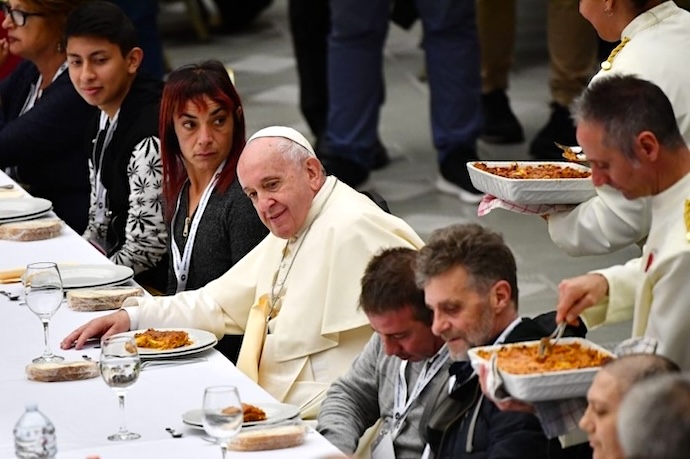The good news about the Vatican’s recent document, “Dignitas Infinita: on Human Dignity” is that most people will not read it. This shoddily written, self-referential, unresearched paper wouldn’t get most first-year graduate students in theology a passing grade. The document, much of which could have been written on the heels of Vatican II in the late 1960s, is allegedly about human dignity. Instead, after a promising opening, it becomes a mishmash of the many and varied finite indignities (phrase and emphasis mine) that the Vatican perpetrates against persons about whose lives it knows sweet nothing.
This could have been a useful statement on living in postmodernity with a commitment to human and cosmic flourishing. It would have added a helpful chapter to the ongoing moral musings of the Roman Catholic faith community as it faces new and powerful scientific data that reflect a wide array of human possibilities. But that would have required reading broadly in new areas of study like feminist, disability, and queer theories. It’s a lost opportunity because Catholic teaching documents are few and far between. Living Catholics, even young ones, might not see much progress if this outdated piece is any evidence of the pace of change.
The Declaration, signed by Victor Manuel Cardinal Fernández, Prefect of the Dicastery for the Doctrine of the Faith, is the product of five years of internal bickering. It begins with an odd and unnecessary introduction to the process of producing a consensus statement in a deeply divided church.
Too Much Information Syndrome.
Readers don’t care how such high-level documents are written. The murky details of this sorry history read more like an effort to shift the blame and excuse the failings than anything relevant to the final content.
Pope Francis has the last say in these matters. He seems to have a penchant for appearing to be more inclusive and welcoming in personal encounters than in the texts he signs off on. This is now one of them. File it under Galatians 6:7, “You reap what you sow.” That shuffling sound you hear is people moving right along as there’s little to see here, little that helps at a brutal time in global history when serious moral reflection is needed. This is not it.
The rest of the document, 66 numbered paragraphs, includes an introduction to the notion of human dignity which for the Vatican boils down to Natural Law, and a history of the concept of human rights as it has emerged in Catholicism and some global platforms. The second half is a catalog of what are considered by the writers to be “grave violations” of human dignity: poverty, war, injustice to migrants, human trafficking, sexual abuse, violence against women, abortion, surrogacy, euthanasia and assisted suicide, marginalization of people who live with disabilities, gender theory, sex change, and last but not least, right out of left field, digital violence.
Who decreed these the most egregious? In what universe do trans people belong with war; people who have abortions with human traffickers? Category errors abound. The complete misses on anything sexual raise the question of how much the Roman Catholic Church knows about war and poverty. If the same research and analytic techniques apply, I fear the answer could be not much.
The document concludes with a fervorino (a kind of pep-rally type prayer) about how the Roman Catholic Church “encourages the promotion of the dignity of every human person, regardless of their physical, mental, cultural, social and religious characteristics…” Tell that to a trans person, a family growing through the generosity of a surrogate, or a pregnant person who decides to end their pregnancy. Their human dignity is erased by the content of this document. Their rights are threatened and/or removed by certain Catholic lawmakers, like some US Supreme Court justices, who bring their religion to the office like their lunch.
This is a document that would have been improved by not being published. Press attention has focused on the sections on abortion, surrogacy, gender theory, and sex change, but that’s the low-hanging fruit in this statement, easy to understand and digest even if one rejects it. For example, on abortion, Vatican writers don’t bother to acknowledge Catholic scholarship like that of moral theologian Daniel C. Maguire who has explained that Roman Catholics have been of many minds on abortion over the long years. The many very complicated issues included do not lend themselves to a few short paragraphs. Whose idea was this mini-catechism of morality? The format is not appropriate to the content.
On abortion, Francis’ writers want people “to have the courage to look the truth in the eye and call things by their proper name.” Yet they’re incapable of admitting that “interruption of pregnancy” is a legitimate if contemporary expression for the termination of a process called pregnancy. Their magical thinking about egg-plus-sperm-voilà baby reflects an earlier, now outdated, scientific view.
The document’s treatment of gender theory is intellectually embarrassing and harmful. University of Chicago law professor Mary Anne Case has documented “the Vatican’s decades-long, worldwide, multi-front war on what it has come to call ‘gender ideology.’” She observes that while the Vatican isn’t alone in its “religious opposition to feminism and sexual rights,” its “long-standing and globally influential” role makes it important to understand:The Vatican’s declared aim in this war is to put a stop not only to the English word ‘gender’ as it is used in legal and policy-making documents by such bodies as the United Nations and the European Union but also to those many reforms in secular law governing the sexes, sexuality, reproduction, and the family that the Vatican associates with what it calls ‘the gender theory.’”
Case notes that “The US constitutional law of sex discrimination that [Justice Ruth Bader] Ginsburg helped establish mandated precisely what Ratzinger feared the most: it categorically prohibited the instantiation in law of ‘fixed notions concerning the roles and abilities of males and females,’ otherwise known as sex stereotypes.”
When Sr. Jeannine Gramick, co-founder of New Ways Ministry and an ardent supporter of Pope Francis, informed him that the Vatican’s notion of “gender ideology” is problematic, Francis responded, “Gender ideology makes everyone equal without respect for personal history… [it] nullifies differences.” To which, Jeannine replied, “Quite the opposite is true: those who use that term do not consider or respect a person’s history and experience of gender. I believe that people who use the term ‘gender ideology’ have most likely never accompanied transgender persons.” This difference is perhaps a matter of semantics, context, or even translation. But the human toll, especially on trans and other queer people, is simply too big to ignore.
Joseph Cardinal Ratzinger, later Pope Benedict XVI, was right. The whole house of cards built on sex stereotypes would fall if Rome recognized all persons as equally valued in fact, not only in word. Would that ‘dignity’ applied to all ‘infinitely’ and without conditions imposed by a few who pretend to speak for the many. But this would require treating women and non-binary people as equals. Because all persons are made in the image of God, then the Church would have to teach that God is trans and non-binary, and yes, even female. The Church has long and shamelessly taught only about a God who is Father, Lord, Ruler, King. Imagine the hymns and images, the changes in self-concept for so many people newly empowered. No such luck here.
It is hard to take seriously the Vatican’s words about violence against women when its own policies contradict them. Where do men get the idea that they’re superior to women if not from a church that reinforces it at every Mass when the presider looks like them, when virtually every decision of consequence is made by men? Spiritual violence against women is real. It deserves serious treatment, apology, and remedy. It’s not even acknowledged here.
‘Sex change’ is a trivializing way to frame the complexities of trans and non-binary life.
The big danger is that this document will be used to bolster oppression. For example, the US Conference of Catholic Bishops can use it to increase pressure on Catholic hospitals to deny gender affirming medical care. This shorthand gets turned into hospital policies that allow and compel staff to discriminate. This threat alone is enough to make strong critique of the papally-approved document necessary. The medical issues require far more nuance as do the psychological and spiritual ones.
Theology like this is a danger and theologians have a duty to warn. More important, trans people deserve better research, to be listened to more thoughtfully, and full participation in conversations about them. None of that is reflected in this document. No pictures of Pope Francis eating with trans people will erase the damage done here by denying that human dignity involves choices as well as givens.
Surrogacy is another complicated set of issues boiled down to three paragraphs and delivered wholesale. Again, the absence of information and the lack of recognition of the many people for whom surrogacy has been a positive experience renders this section moot. There’s something so perverse about a group of male, allegedly celibate clerics opining about surrogacy that makes me glad so few people read these documents.
I suggest instead reading Professor of Ethics Grace Y. Kao’s recent book My Body, Their Baby: A Progressive Christian Vision for Surrogacy (Stanford, CA: Stanford University Press, 2023). Professor Kao, tenured at Claremont School of Theology, describes her experience acting as a surrogate. Vatican officials might not like it, but at least they would have a little better idea of what they’re talking about than is evident in their text.
There is no reason to trust anything they say about people with disabilities given how shabbily many Catholic institutions ignore and mistreat such neighbors. I advise passing right over those two scant paragraphs and turning instead to the exceptional book by Rabbi Dr. Julia Watts Belser, Loving Our Own Bones: Disability Wisdom and the Spiritual Subversiveness of Knowing Ourselves Whole (Boston: Beacon Press, 2023).
In a brilliant mix of queer, feminist, and disability theories combined with a critical reading of Hebrew Scripture, this Georgetown University professor writes of a God on wheels. She makes the transformative point that disabilities are a normal part of human life. The work is to change our default expectations to the benefit of all—curb cutouts accommodate luggage as well as wheelchairs, and accessible restrooms improve life for everyone. The task is not to accommodate people living with disabilities, but to see human variety in all its dignity and act accordingly. Imagine a God who signs, and you get the point.
I cite Mary Anne Case, Grace Kao, and Julia Watts Belser as excellent examples of scholarship that’s utterly outside the scope of the writers of this woefully inadequate document. Unbelievable as it may seem in 2024, and given the focus on issues like sex and gender, the 116 footnotes to this document include exactly no references to anything written by a woman. And, nearly half (at least 56) of the references are to the writings of Francis with most of the rest related to other church documents. This alone results in remarkably thin gruel. It suggests that remedial work is in order.
One-size-fits-all ethics works about as well as shoes of the same sort. Yet, take the new case of digital violence that strangely gets tacked onto the end of the list of problems here. There are few earlier church pronouncements on it because of the newness of the phenomenon. And there’s relatively little emotional baggage yet on AI and the like, though the Vatican is beginning to get involved in the conversation. However, in this attempt, the reflexive nay-saying comes across as formulaic rather than well thought out in the face of a world revolutionized by digital access. The writers don’t feel the need to cite any studies, quote any experts, or delve into the complexities of the digital revolution before giving it a thumbs down.
After all, it’s the same internet that conveys this church document as well as pornography; the same Zoom that puts us face to face in worship as in planning for war. The differences matter and merit far more consideration than these paltry paragraphs offer. Would someone please tell Vatican officials that it’s perfectly acceptable, indeed preferable, to avoid writing about topics about which they know precious little? Why squander any goodwill built up on ecological and economic matters by wading into waters over your head? It only makes the reader wonder what they don’t know about science and money.
Such advice, if it had been heeded by these writers, would have avoided unnecessary and unhelpful confusion, injury, and scandal that have characterized the document’s reception—or in many cases, non-reception. Canon lawyer James A. Coriden’s explanation of “The Canonical Doctrine of Reception” comes to mind. This document is a perfect example of teachings that “the believing community” doesn’t accept. I give this one a polite ‘no thanks’ and suggest others reject it as well.
Some people are comforted by the simple principle that people have “infinite dignity” in every imaginable time and place. But such claims either have to be demonstrated in the cases where dignity is enhanced by those who have gender-affirming surgery, those who engage in surrogacy, those who choose to have abortions—or they’re fiction.
Moreover, one can’t have it both ways: either dignity is infinite or it isn’t. Last I checked, infinity was endless. Even the document has a reference to John Paul II acknowledging that “dignity is infringed on the individual level when due regard is not had for values such as freedom…physical and mental integrity, the right to essential goods, to life.”
And I would add, to death, sending the section on Euthanasia and Assisted Suicide back for a complete rewrite based on human experience. For example, calling suffering “an opportunity to strengthen the bonds of mutual belonging…” is ahistorical and inexcusable. Tell a hospice nurse that their patient is “strengthening the bonds of mutual belonging” and see what happens.
Two additional factors make this document exceptionally problematic. The first is that the contradictions are made worse by the stated claims of wanting to be a synodal church; that is, a more listening and dialogic church than its ancestors. ‘Synod’ is insider vocabulary meant to signal dialogue, listening, and ‘walking together’ (synod) toward love and justice. Good luck with that when this, the official statement on morality, reflects neither participation nor openness to new sources and new voices. The dissonance makes obvious that the power structure hasn’t changed a whit since Vatican II.
The second, and to my lights the more egregious problem, is the complete absence of any pastoral sensitivity which ought to be the hallmark of every church teaching.
A group of parents connected with the Malta-based, Catholic-rooted, pro-LGBT organization Drachma expressed their deep concerns about the sex/gender aspects of the document to Francis. His public welcome of queer (especially trans) people, does not square with this doctrinal statement. They said the document makes it hard for them to remain Catholic. Francis, though his correspondence is not public, is said to have “received their critique with an ‘open heart.’” How open his mind is remains to be seen.
Dignity is elusive here. What about the dignity of the dying person who has made clear their wishes to complete their life? What of the dignity of the trans person who rejoices in their newfound gender consonance? What about the dignity of a couple who want to raise a child birthed by a surrogate? Their dignity, and the dignity in their choices, are simply of no consequence to the writers of this document. Rather, indignities abound. Luckily, they are finite because not even the Vatican can stop how times change and even how time changes.
We’re not in the 16th century when it took months for information to travel from one place to another. Our instantaneous communication doesn’t guarantee wisdom, but it does set up the expectation that we will seek the best information available. And because we can, we need to talk with and, more importantly, listen to people who are struggling in good faith with tough issues. We’re right to expect changes in our lifetime. We must change our minds to expand the range of human dignity. These include changes in how we think about many of the issues the Vatican has only rehearsed here, one more time for the road and largely without wisdom.
Fortunately, the indignities at hand are themselves finite. The clock has run out on the Roman Catholic Church in the moral arena given its internal track record and inability to broaden its sources and absorb new data. With this deeply flawed document, many people have come to the end of their patience with finite indignities peddled as morality. They seek other communities and deeper wisdom which offer more than lip service to their infinite dignity.





